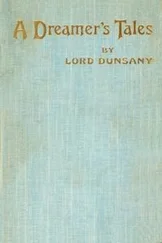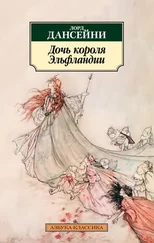Now that he was King in the city of Larkar and in all the desert that lay to the East and North he sent his fancy to wander further afield. He took the regiments of his camel–guards and went jingling out of Larkar, with little silver bells under the camels' chins, and came to other cities far–off on the yellow sand, with clear white walls and towers, uplifting themselves in the sun. Through their gates he passed with his three silken regiments, the light–blue regiment of the camel–guards being upon his right and the green regiment riding at his left, the lilac regiment going on before. When he had gone through the streets of any city and observed the ways of its people, and had seen the way that the sunlight struck its towers, he would proclaim himself King there, and then ride on in fancy. So he passed from city to city and from land to land. Clear–sighted though Mr. Shap was, I think he overlooked the lust of aggrandizement to which kings have so often been victims; and so it was that when the first few cities had opened their gleaming gates and he saw peoples prostrate before his camel, and spearmen cheering along countless balconies, and priests come out to do him reverence, he that had never had even the lowliest authority in the familiar world became unwisely insatiate. He let his fancy ride at inordinate speed, he forsook method, scarce was he king of a land but he yearned to extend his borders; so he journeyed deeper and deeper into the wholly unknown. The concentration that he gave to this inordinate progress through countries of which history is ignorant and cities so fantastic in their bulwarks that, though their inhabitants were human, yet the foe that they feared seemed something less or more; the amazement with which he beheld gates and towers unknown even to art, and furtive people thronging intricate ways to acclaim him as their sovereign—all these things began to affect his capacity for Business. He knew as well as any that his fancy could not rule these beautiful lands unless that other Shap, however unimportant, were well sheltered and fed: and shelter and food meant money, and money, Business. His was more like the mistake of some gambler with cunning schemes who overlooks human greed. One day his fancy, riding in the morning, came to a city gorgeous as the sunrise, in whose opalescent wall were gates of gold, so huge that a river poured between the bars, floating in, when the gates were opened, large galleons under sail. Thence there came dancing out a company with instruments, and made a melody all around the wall; that morning Mr. Shap, the bodily Shap in London, forgot the train to town.
Until a year ago he had never imagined at all; it is not to be wondered at that all these things now newly seen by his fancy should play tricks at first with the memory of even so sane a man. He gave up reading the papers altogether, he lost all interest in politics, he cared less and less for things that were going on around him. This unfortunate missing of the morning train even occurred again, and the firm spoke to him severely about it. But he had his consolation. Were not Arathrion and Argun Zeerith and all the level coasts of Oora his? And even as the firm found fault with him his fancy watched the yaks on weary journeys, slow specks against the snow–fields, bringing tribute; and saw the green eyes of the mountain men who had looked at him strangely in the city of Nith when he had entered it by the desert door. Yet his logic did not forsake him; he knew well that his strange subjects did not exist, but he was prouder of having created them with his brain, than merely of ruling them only; thus in his pride he felt himself something more great than a king, he did not dare to think what! He went into the temple of the city of Zorra and stood some time there alone: all the priests kneeled to him when he came away.
He cared less and less for the things we care about, for the affairs of Shap, the business–man in London. He began to despise the man with a royal contempt.
One day when he sat in Sowla, the city of the Thuls, throned on one amethyst, he decided, and it was proclaimed on the moment by silver trumpets all along the land, that he would be crowned as king over all the lands of Wonder.
By that old temple where the Thuls were worshipped, year in, year out, for over a thousand years, they pitched pavilions in the open air. The trees that blew there threw out radiant scents unknown in any countries that know the map; the stars blazed fiercely for that famous occasion. A fountain hurled up, clattering, ceaselessly into the air armfuls on armfuls of diamonds. A deep hush waited for the golden trumpets, the holy coronation night was come. At the top of those old, worn steps, going down we know not whither, stood the king in the emerald–and–amethyst cloak, the ancient garb of the Thuls; beside him lay that Sphinx that for the last few weeks had advised him in his affairs.
Slowly, with music when the trumpets sounded, came up towards him from we know not where, one–hundred–and–twenty archbishops, twenty angels and two archangels, with that terrific crown, the diadem of the Thuls. They knew as they came up to him that promotion awaited them all because of this night's work. Silent, majestic, the king awaited them.
The doctors downstairs were sitting over their supper, the warders softly slipped from room to room, and when in that cosy dormitory of Hanwell they saw the king still standing erect and royal, his face resolute, they came up to him and addressed him:
"Go to bed," they said—"pretty bed." So he lay down and soon was fast asleep: the great day was over.
It was the custom on Tuesdays in the temple of Chu–bu for the priests to enter at evening and chant, "There is none but Chu–bu."
And all the people rejoiced and cried out, "There is none but Chu–bu." And honey was offered to Chu–bu, and maize and fat. Thus was he magnified.
Chu–bu was an idol of some antiquity, as may be seen from the colour of the wood. He had been carved out of mahogany, and after he was carved he had been polished. Then they had set him up on the diorite pedestal with the brazier in front of it for burning spices and the flat gold plates for fat. Thus they worshipped Chu–bu.
He must have been there for over a hundred years when one day the priests came in with another idol into the temple of Chu–bu, and set it up on a pedestal near Chu–bu's and sang, "There is also Sheemish."
And all the people rejoiced and cried out, "There is also Sheemish."
Sheemish was palpably a modern idol, and although the wood was stained with a dark–red dye, you could see that he had only just been carved. And honey was offered to Sheemish as well as Chu–bu, and also maize and fat.
The fury of Chu–bu knew no time–limit: he was furious all that night, and next day he was furious still. The situation called for immediate miracles. To devastate the city with a pestilence and kill all his priests was scarcely within his power, therefore he wisely concentrated such divine powers as he had in commanding a little earthquake. "Thus," thought Chu–bu, "will I reassert myself as the only god, and men shall spit upon Sheemish."
Chu–bu willed it and willed it and still no earthquake came, when suddenly he was aware that the hated Sheemish was daring to attempt a miracle too. He ceased to busy himself about the earthquake and listened, or shall I say felt, for what Sheemish was thinking; for gods are aware of what passes in the mind by a sense that is other than any of our five. Sheemish was trying to make an earthquake too.
The new god's motive was probably to assert himself. I doubt if Chu–bu understood or cared for his motive; it was sufficient for an idol already aflame with jealousy that his detestable rival was on the verge of a miracle. All the power of Chu–bu veered round at once and set dead against an earthquake, even a little one. It was thus in the temple of Chu–bu for some time, and then no earthquake came.
Читать дальше












